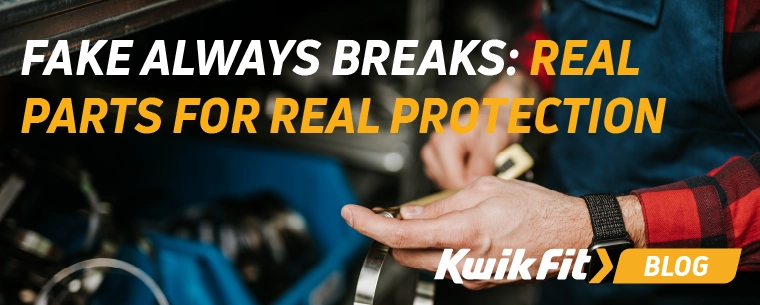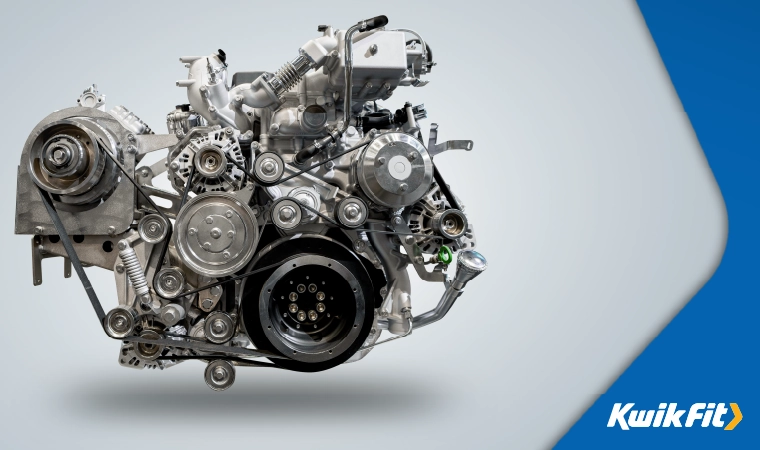Fake Always Breaks: Real Parts for Real Protection
Kwik Fit | Thursday 12th December 2024 8:30am

As the nights draw in and temperatures fall, itís a sure sign winterís on its way. As a result, you may be considering how to get your vehicle ready for driving in dark and wet conditions.
But, whether youíre looking for winter tyres or to have your brake pads replaced, itís important to take care not to buy fake parts.
Kwik Fit has joined forces with the Intellectual Property Office - the official UK government body responsible for intellectual property (IP) rights, including patents, designs, trademarks and copyright - to raise awareness of the dangers of buying and using counterfeit vehicle parts. As part of the ďFake Always Breaksí campaign, this guide will explain what fake parts are, how to spot them, and what to do if you find a counterfeit.
What are fake vehicle parts?
Fake, or counterfeit, parts are items and components which are advertised and sold to consumers as being genuine, branded vehicle parts. These can include steering components, wheels and airbags, as well as windscreen wipers and headlights - the very type of parts you may be looking to replace as part of getting your car winter-ready.
Why are fake parts a problem?
Counterfeit parts present a growing concern within the automotive industry. An online survey commissioned by the IPO Censuswide in October 2024 of UK motorists revealed that one in six (15%) of the 1,394 respondents have purchased a counterfeit part in the past 12 months alone.
Not only are fake parts designed to mimic genuine parts, but they are often made from substandard materials and are not safety-tested. As well as not meeting safety regulations, they also have an increased risk of failure. This can have a life-changing, or even life-ending, impact for drivers, passengers and other road users.
How common are fake parts?
As well as being a growing UK issue, fake parts are also a global problem - with regular seizures being made around the world. According to OECD research, the value of counterfeit vehicle parts imported to the UK is almost £1billion a year.
Weíve already touched on the safety issues associated with counterfeit vehicle parts, but there are financial and legal implications too. Not only can vehicle parts invalidate your motor insurance and void vehicle warranties, but they can also cause liabilities for the garages who supply and fit them.
What are the most commonly-purchased fake vehicle parts?
The IPO survey revealed that number one on the list of most commonly-purchased fake parts in the UK are car batteries, bought by 25% of the motorists who admitted buying counterfeit parts. This was followed by wheels/tyres (23%), and windscreen wipers (19%).
Even more concerning was that 14% of the motorists who admitted to purchasing fake parts had bought counterfeit airbags, and 12% had bought fake brake pads or discs.
Why do people buy counterfeit vehicle parts?
Unsurprisingly, cost is the main driver for those intentionally purchasing fake parts. Nearly a third of those surveyed (31%) who intentionally bought fake parts cited cost savings as the reason.
Another reason is that many motorists who buy fake parts donít think there is any difference in appearance between counterfeit and genuine components. More worryingly, however, is that many purchases are made unknowingly - with motorists thinking they have bought a genuine part. This was the case with 45% of those surveyed. Motorists may not discover the fake part until after it fails, or during regular service checks.

How motorists can spot fake parts
The IPO has provided the following guidance on how to identify a fake part, and what you should do if you spot a fake advertised.
Be wary of price
If a branded part is being offered for sale at a cheaper price than youíd expect, then itís probably too good to be true.
Research the seller
If the part is being sold by an unfamiliar company, do your homework. Research them online, including checking out both customer and online retailer reviews.
Check the spec
Fake parts can often be a Ďone size fits allí and not designed for your specific vehicle type.
Look for proof
Manufacturers of genuine parts will always provide a certificate of Original Equipment (OE) matching quality, whereas fake parts wonít have this.
If youíre still unsure, then seek advice from a Chartered Trading Standards Institute (CTSI) approved garage, such as those who belong to the Trust My Garage Network, a local independent garage, authorised manufacturer dealership or parts distribution centre.
What should you do if you find a counterfeit part?
If youíve spotted fake parts for sale or think you may have unwittingly purchased one, then hereís what you should do:
Talk to the manufacturer
Most manufacturers will provide tools to check the authenticity of parts, and advice on how to report counterfeits.
Advise the retailer
If youíve purchased a fake product, youíre legally entitled to a full refund within 30 days of having paid for them. Online marketplaces, including eBay and Amazon, have guides with how to report fakes, as well as their refund policy.
Report it to Crimestoppers
As the sale of counterfeit parts is illegal, you can report it to Crimestoppers, either online or by calling them anonymously on 0800 555 111.
More information on the Fake Always Breaks campaign, including extra guidance for consumers can be found on the UK Government website.
If you have concerns about any of the parts on your car currently, pop into your local Kwik Fit centre. Our skilled specialists can take a look, and help to put your mind at ease.
Any facts, figures and prices shown in our blog articles are correct at time of publication.
Featured Articles
Is it Illegal to Drive With One Headlight?
Saturday 19th July 2025
Wondering if itís illegal to drive with one headlight? Learn about the safety risks and penalties of illegal blown bulbs and why you should fix them promptly.
Air Con in EVs & Hybrids: Experts Answer Your Questions
Monday 30th June 2025
Does air con drain EV batteries? Can you use the air con while charging an electric car? Find out the answers to these questions & more from Kwik Fitís experts.
Why Is Your Car Making a Noise? Fixes & Tips
Friday 13th June 2025
When your car starts making unexpected noises, it can certainly be quite disconcerting; it may be nothing to worry about, but hereís what you need to know.









